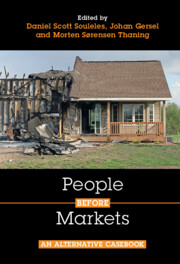Book contents
- People Before Markets
- People Before Markets
- Copyright page
- Dedication
- Contents
- Contents by Topic
- Authors
- 1 Introduction: Why Are You Here?
- 2 Some Philosophical Help with “Neoliberalism”
- Part I Our World
- 3 Where Should Food Come From?
- 4 Where Should Water Come From?
- 5 Who Gets to Own Land?
- 6 How Should Food be Produced?
- 7 Who Decides Where They Live?
- 8 How Much Land Do We Need?
- 9 Where Should We Park?
- 10 How Should We Deal with Climate Change?
- 11 How Should We Make an Impact?
- Part II Our Lives
- Part III Our Work
- Index
- References
9 - Where Should We Park?
from Part I - Our World
Published online by Cambridge University Press: 27 October 2022
- People Before Markets
- People Before Markets
- Copyright page
- Dedication
- Contents
- Contents by Topic
- Authors
- 1 Introduction: Why Are You Here?
- 2 Some Philosophical Help with “Neoliberalism”
- Part I Our World
- 3 Where Should Food Come From?
- 4 Where Should Water Come From?
- 5 Who Gets to Own Land?
- 6 How Should Food be Produced?
- 7 Who Decides Where They Live?
- 8 How Much Land Do We Need?
- 9 Where Should We Park?
- 10 How Should We Deal with Climate Change?
- 11 How Should We Make an Impact?
- Part II Our Lives
- Part III Our Work
- Index
- References
Summary
This chapter compares the ways that two similarly sized cities, Chicago and Amsterdam, have chosen to govern their streets. Chicago sold a seventy-five-year concession to manage street parking to a consortium of private investors, whereas Amsterdam’s government maintains the ability to directly govern its streets. In turn, Chicago is an illustration of how privatization of a common good according to money-lending logics, far from allowing for flexibility and efficient governance, completely prevents a city from changing with the times. Chicago has lost control over its own streets and can no longer decide what their best use is without paying an extortionate price. Any governing of a shared communal space that has a broader concern than generating profit for a private corporation is here effectively undermined by allowing marketized parking. For the purposes of this book, the Chicago/Amsterdam comparison illustrates the limitations of using privatized business actors to efficiently govern shared city space. It also serves as a counterexample to the neoliberal dogma that government should abstain from planning, because their attempts at doing so cannot outperform the market.
Keywords
- Type
- Chapter
- Information
- People before MarketsAn Alternative Casebook, pp. 171 - 183Publisher: Cambridge University PressPrint publication year: 2022

